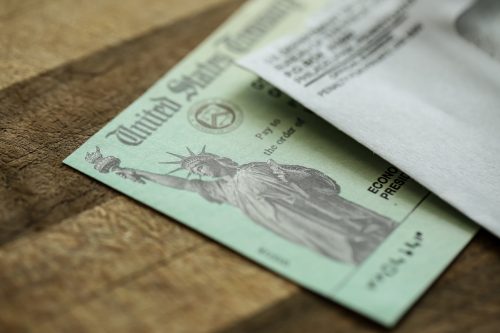You Can Get a Bigger Tax Refund From the IRS If You Did This in 2021

The 2022 tax season is upon us and taxpayers have to keep up with a slew of recent changes in order to file their returns before the April 18 deadline. From child tax credits to stimulus payments, there are a number of new factors that can affect how you file your 2021 tax return, not to mention how much you get back from the Internal Revenue Service (IRS). Tax experts have already warned taxpayers to expect smaller refunds, but you could actually end up with a bigger payday than expected. Read on to find out what you might have done in 2021 that will get you more money back.
RELATED: The IRS Just Issued a New Warning to All Taxpayers.
If you had a child last year, you can collect child tax credits from the IRS.

Taxpayers who had a new member join their family in 2021 could be looking to rake in thousands more from the IRS this tax season, according to USA Today. Last year, the agency doled out advance child tax credit payments—half of the entire credit—to parents and guardians based on their 2020 tax return. For each qualifying child 5 years old or younger, these taxpayers will receive a total of $3,600, and for each qualifying child 6 to 17 years old, they will receive a total of $3,000.
“For tax year 2021, a qualifying child is an individual who does not turn 18 before Jan. 1, 2022,” the IRS explains on its website. Many taxpayers received $1,800 for younger children and $1,500 older children from July to December of last year. But if you had a qualifying child in 2021, that would not be reflected on your 2020 tax return, so the IRS would not have known to provide a child tax credit to you.
“If you are eligible for the Child Tax Credit, but did not receive advance Child Tax Credit payments, you can claim the full credit amount when you file your 2021 tax return during the 2022 tax filing season,” the IRS confirms.
You can also receive another stimulus payment.

Parents or guardians who did not claim a dependent’s $1,400 stimulus check last year can also get this money in their refund, according to USA Today. Taxpayers can file for this payment on behalf of the dependent—as long as they have a valid social security number or adoption taxpayer identification number issued by the IRS—through claiming a Recovery Rebate Credit on their 2021 tax return. They would then receive this money with their tax refund.
“Parents of a child born in 2021–or parents and guardians who added a new qualifying child to their family in 2021–did not receive a third-round Economic Impact Payment for that child and may be eligible to receive up to $1,400 for the child by claiming the Recovery Rebate Credit,” the IRS noted in a Jan. 26 announcement. “Individuals must claim the 2021 Recovery Rebate Credit on their 2021 income tax return in order to get this money; the IRS will not automatically calculate the 2021 Recovery Rebate Credit.”
RELATED: For more up-to-date information, sign up for our daily newsletter.
But both payments have income restrictions.

Combining both the child tax credit and a stimulus payment could add up to $5,000 more from the IRS per child. But you do have to fall under certain income requirements to be eligible for both the child tax credit and stimulus payment. For the child tax credit, the qualifications are rather broad. Single-filers need to make $200,000 or less in annual income to be eligible for the entire payment, and couples filing jointly need to make $400,000 or less, per the IRS.
But the Economic Impact Payments have stricter guidelines. According to the IRS, you’re eligible for the entire $1,400 stimulus check—per dependent—if you are a single filer who made $75,000 or less in annual income for 2021, a head of household filer who made $112,500 or less, or a married/joint-filer who made $150,000 or less. If you made more than this, your check is reduced. But the cap is $80,000 for single-filers, $120,000 for head of household filers, and $160,000 for married/joint-filers, so you won’t receive anything if your 2021 income was higher than this.
The IRS has warned that your refund may be delayed.

Filing for a child tax credit could end up impacting your refund if you’re not careful. According to the IRS, if you fail to properly reconcile credits on your 2021 federal tax return, the processing of your return will be delayed and your refund make take even longer as a result. For taxpayers who file a return with no issues, the IRS says that they should receive a refund within 21 days—if they file electronically and choose direct deposit.
“IRS employees are working hard to deliver a successful 2022 tax season while facing enormous challenges related to the pandemic,” IRS Commissioner Chuck Rettig said in a statement. “There are important steps people can take to ensure they avoid processing delays and get their tax refund as quickly as possible. We urge people to carefully review their taxes for accuracy before filing. And they should file electronically with direct deposit if at all possible; filing a paper tax return this year means an extended refund delay.”
RELATED: IRS Warns You Won’t Be Able to File Online Without Doing This First.